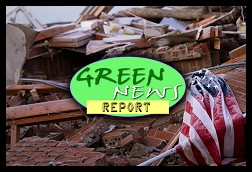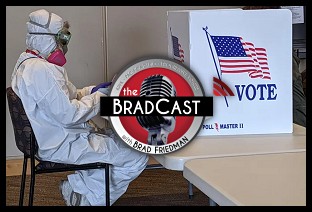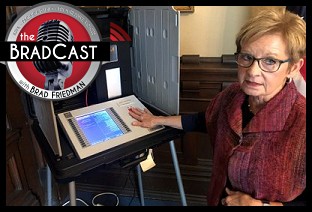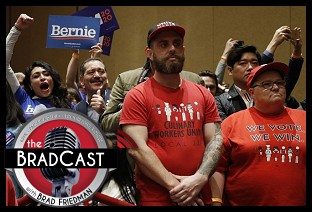 We've got another sorry tale on today's BradCast of yet another federal "watchdog" agency clearly captured by the industry corporations that it is supposed to be overseeing and/or regulating. This time, democracy itself is at stake. [Audio link to full show is posted below this summary.]
We've got another sorry tale on today's BradCast of yet another federal "watchdog" agency clearly captured by the industry corporations that it is supposed to be overseeing and/or regulating. This time, democracy itself is at stake. [Audio link to full show is posted below this summary.]
But first up today, we had quite a bit of breaking news just before airtime. For a start, the U.S. Capitol was locked down on Friday after two Capitol Police officers were rammed in a violent attack with a vehicle. One of the officers, an 18-year veteran, was killed. The other was said to be "fighting for his life" as of airtime. After ramming the officer, the assailant is said to have "lunged" at officers with a knife and was subsequently shot and killed. The assault was the most serious threat on the Capitol since the Donald Trump-incited insurrection on January 6th, which killed five, including one U.S. Capitol Police officer. Two more officers took their lives in the ensuing days after that attack by Trump supporters attempting to stop Congressional ratification of Joe Biden's 2020 Electoral College victory.
That attack --- and Trump's evidence-free Big Lie about his loss being the result of "fraud" --- continues to reverberate almost three months since the MAGA Mob's assault on U.S. democracy. Last week, Georgia's Republican-dominated state legislature adopted a massive voter suppression bill that will make it more difficult to vote by, among other things, requiring additional forms of ID for mail voting, limiting absentee ballot drop-boxes and early voting hours, and banning the distribution of food or beverages to voters forced to wait hours on line. It would also allow partisan GOP officials to undermine County Boards of Election and even overturn results. The state's Governor, Brian Kemp (R), signed the sweeping bill almost immediately after it passed both chambers of the state legislature in a matter of hours.
This week, after some 70 Black corporate executives spoke out against the transparent attempt to making voting more difficult for minorities in the state, a cascade of other corporate entities --- including Delta Airlines and Coca-Cola, both based in Atlanta --- finally decided to speak out in favor of democracy and against voter suppression. And then, on Friday, shortly before today's show, Major League Baseball announced they will be moving the All-Star Game and MLB Draft, previously set for July in Atlanta, to another state in response to the GOP attack on voting.
And, as Georgia Republicans pushed back on Delta Airlines this week for belatedly standing up for the right to vote, Gov. Kemp took his shot at the company by accusing its CEO of "false attacks" by claiming misleadingly in a statement: "The last time I flew Delta I had to show my ID."
But Kemp, the state's former Sec. of State, certainly knows that flying is a privilege, where voting is a right. He also likely knows that, no, an ID is not required to fly on Delta or any other airline. As clearly explained on the TSA.gov website...
In the meantime, as to real --- versus imagined or opportunistic and partisan --- threats of fraud in our elections, the U.S. Election Assistance Commission (EAC), the federal agency tasked with overseeing voting system security standards, is continuing the woeful job it has done since its creation by the Help America Vote Act of 2002. Since its inception, as we have documented at The BRAD BLOG for almost 20 years, the EAC has largely been captured by the private voting system vendors whose systems they are supposed to be testing, overseeing, regulating and certifying as meeting minimal standards.
For years, the EAC has consistently helped mislead the public regarding the dangers of modems inside of computer voting and tabulation systems. The EAC's original Voluntary Voting System Guidelines (VVSG), created about 15 years ago, allowed for use of the devices which cybersecurity experts have long warned can be used to introduce malware into systems that could disrupt elections or change results.
In August of 2019, as we detailed on the program at the time with cybsersecurity journalist Kim Zetter, a group of security and voting systems experts discovered "nearly three dozen backend election systems in 10 states connected to the internet over the last year, including some in critical swing states" such as Wisconsin, Michigan and Florida. In January of 2020, almost six months after Zetter's exclusive and disturbing report, Cynthia McFadden followed up with her own report at NBC News, in which, despite federal officials repeatedly and falsely declaring that "U.S. voting systems are never connected to the Internet," the President of the nation's largest vendor, Elections Systems and Software, Inc. (ES&S), conceded that at least 14,000 of the company's modems were being used in vulnerable voting and tabulation systems across the country, even as the 2020 election cycle was getting under way.
Nonetheless, over the last five years, the EAC has been working with stakeholders --- from elections officials to cybersecurity experts to vendors --- to develop new minimum security standards for the nation's voting systems, which they call VVSG 2.0. The good news is that the draft of those final standards for the VVSG 2.0, made available for public comment last Summer, included a ban on modems and other wireless communications devices in computerized voting and tabulation systems.
The bad news: After the public comment period and before the new standards were officially adopted by the EAC Commissioners, they apparently met in secret with several vendors and quietly changed the new standards to once again allow for modems and other wireless communications devices in new voting systems.
After the standards changed and weakened without public notice, the non-partisan government watchdog, Free Speech for People (FSFP), filed public records requests for documentation of the non-public meetings between EAC officials and the voting machine companies. Despite acknowledging hundreds of pages of existing documents responsive to the request, according to our guest today, the EAC failed to turn over any of it to the group. Now, FSFP is suing the EAC for those documents.
We're joined today by longtime election integrity advocate SUSAN GREENHALGH, Senior Advisor on Election Security at FSFP, to explain the organization's lawsuit [PDF], and the latest, extraordinary failure to protect our elections by the corporate-captured EAC.
"We have a real lack of leadership from the federal agency that's supposed to be helping assist election officials run election more efficiently, securely, accessibly and transparently at the EAC," Greenhalgh explains, charging "they're letting the vendors help weaken the standards directly."
"The EAC is way, way too deferential to the vendors," she says. "They need to either do the right thing and do their job, or they need get out of the lane and come up with some other way. Because there's an expectation by members of Congress that this is being taken care of, that the EAC is doing their job, they're developing the standards, they're testing voting systems. Unless you scratch the surface and find out what's really going on, you might think on the outside that they're doing their job, and they're not. They're taking up that space, and that makes us all less safe and secure in our elections."
There is, as you might guess, much more that Greenhalgh has to explain about this ongoing mess and FSFP's legal efforts to crack open the EAC blockade.
Finally, we close today with a rather hilarious audio message from former, George W. Bush-era Republican House Speaker John Boehner, to Texas' Trumpy, conspiracy-loving U.S. Senator Ted Cruz...
(Snail mail support to "Brad Friedman, 7095 Hollywood Blvd., #594 Los Angeles, CA 90028" always welcome too!)
|


 Sunday 'Cutting Corners' Toons
Sunday 'Cutting Corners' Toons 'A World of Tyrants,
'A World of Tyrants, 'Green News Report' 5/22/25
'Green News Report' 5/22/25
 'Dangerous Times': Climate Scientist Warns Trump 'Censorship' Endangering Nat'l Security: 'BradCast' 5/21/25
'Dangerous Times': Climate Scientist Warns Trump 'Censorship' Endangering Nat'l Security: 'BradCast' 5/21/25 And Then They Came for Members of Congress...: 'BradCast' 5/20/25
And Then They Came for Members of Congress...: 'BradCast' 5/20/25 'Green News Report' 5/20/25
'Green News Report' 5/20/25 Appeals Court Blocks Last Route for Voters to Challenge Violations of the VRA: 'BradCast' 5/19/25
Appeals Court Blocks Last Route for Voters to Challenge Violations of the VRA: 'BradCast' 5/19/25 Sunday 'Now Hoarding' Toons
Sunday 'Now Hoarding' Toons Mad World:
Mad World: 'Green News Report' 5/15/25
'Green News Report' 5/15/25 Plane Corruption and the Future of the DOJ: 'BradCast' 5/14/25
Plane Corruption and the Future of the DOJ: 'BradCast' 5/14/25 'Deeply Evil': GOP Proposes Largest Medicaid Cuts in History: 'BradCast' 5/13/25
'Deeply Evil': GOP Proposes Largest Medicaid Cuts in History: 'BradCast' 5/13/25 'Green News Report' 5/13/25
'Green News Report' 5/13/25 And Then They Came for the Mayors...: 'BradCast' 5/12/25
And Then They Came for the Mayors...: 'BradCast' 5/12/25 Sunday 'New Guy, Old Guy' Toons
Sunday 'New Guy, Old Guy' Toons Blowing Smoke. At the Vatican and White House: 'BradCast' 5/8/25
Blowing Smoke. At the Vatican and White House: 'BradCast' 5/8/25 'Green News Report' 5/8/25
'Green News Report' 5/8/25 SCOTUS Weighs Public Funding of Religious Schools: 'BradCast' 5/7/25
SCOTUS Weighs Public Funding of Religious Schools: 'BradCast' 5/7/25 Trump Judge Blocks NC GOP Theft of 2024 Supreme Court Seat: 'BradCast' 5/6/25
Trump Judge Blocks NC GOP Theft of 2024 Supreme Court Seat: 'BradCast' 5/6/25 Prosecutors Quit After U.S Attny Strikes Deal With Felon Cop: 'BradCast' 5/5/25
Prosecutors Quit After U.S Attny Strikes Deal With Felon Cop: 'BradCast' 5/5/25 Trump Losing Streak Continues into SECOND Hundred Days: 'BradCast' 5/1/25
Trump Losing Streak Continues into SECOND Hundred Days: 'BradCast' 5/1/25 100 Daze (w/ Digby and Driftglass): 'BradCast' 4/30/25
100 Daze (w/ Digby and Driftglass): 'BradCast' 4/30/25 Campaign to 'Impeach Trump Again' Gains Fresh Momentum: 'BradCast' 4/29/25
Campaign to 'Impeach Trump Again' Gains Fresh Momentum: 'BradCast' 4/29/25 And Then They Came for the Judges...: 'BradCast' 4/28/25
And Then They Came for the Judges...: 'BradCast' 4/28/25 Trump EPA Guts Enviro Justice Office: 'BradCast' 4/24/25
Trump EPA Guts Enviro Justice Office: 'BradCast' 4/24/25
 VA GOP VOTER REG FRAUDSTER OFF HOOK
VA GOP VOTER REG FRAUDSTER OFF HOOK Criminal GOP Voter Registration Fraud Probe Expanding in VA
Criminal GOP Voter Registration Fraud Probe Expanding in VA DOJ PROBE SOUGHT AFTER VA ARREST
DOJ PROBE SOUGHT AFTER VA ARREST Arrest in VA: GOP Voter Reg Scandal Widens
Arrest in VA: GOP Voter Reg Scandal Widens ALL TOGETHER: ROVE, SPROUL, KOCHS, RNC
ALL TOGETHER: ROVE, SPROUL, KOCHS, RNC LATimes: RNC's 'Fired' Sproul Working for Repubs in 'as Many as 30 States'
LATimes: RNC's 'Fired' Sproul Working for Repubs in 'as Many as 30 States' 'Fired' Sproul Group 'Cloned', Still Working for Republicans in At Least 10 States
'Fired' Sproul Group 'Cloned', Still Working for Republicans in At Least 10 States FINALLY: FOX ON GOP REG FRAUD SCANDAL
FINALLY: FOX ON GOP REG FRAUD SCANDAL COLORADO FOLLOWS FLORIDA WITH GOP CRIMINAL INVESTIGATION
COLORADO FOLLOWS FLORIDA WITH GOP CRIMINAL INVESTIGATION CRIMINAL PROBE LAUNCHED INTO GOP VOTER REGISTRATION FRAUD SCANDAL IN FL
CRIMINAL PROBE LAUNCHED INTO GOP VOTER REGISTRATION FRAUD SCANDAL IN FL Brad Breaks PA Photo ID & GOP Registration Fraud Scandal News on Hartmann TV
Brad Breaks PA Photo ID & GOP Registration Fraud Scandal News on Hartmann TV  CAUGHT ON TAPE: COORDINATED NATIONWIDE GOP VOTER REG SCAM
CAUGHT ON TAPE: COORDINATED NATIONWIDE GOP VOTER REG SCAM CRIMINAL ELECTION FRAUD COMPLAINT FILED AGAINST GOP 'FRAUD' FIRM
CRIMINAL ELECTION FRAUD COMPLAINT FILED AGAINST GOP 'FRAUD' FIRM RICK SCOTT GETS ROLLED IN GOP REGISTRATION FRAUD SCANDAL
RICK SCOTT GETS ROLLED IN GOP REGISTRATION FRAUD SCANDAL VIDEO: Brad Breaks GOP Reg Fraud Scandal on Hartmann TV
VIDEO: Brad Breaks GOP Reg Fraud Scandal on Hartmann TV RNC FIRES NATIONAL VOTER REGISTRATION FIRM FOR FRAUD
RNC FIRES NATIONAL VOTER REGISTRATION FIRM FOR FRAUD EXCLUSIVE: Intvw w/ FL Official Who First Discovered GOP Reg Fraud
EXCLUSIVE: Intvw w/ FL Official Who First Discovered GOP Reg Fraud GOP REGISTRATION FRAUD FOUND IN FL
GOP REGISTRATION FRAUD FOUND IN FL



















 It's a bit of a grab bag on today's
It's a bit of a grab bag on today's  On today's
On today's  On today's
On today's  On today's
On today's  On today's
On today's  On today's
On today's  On today's
On today's  We've got a whole lot jammed into one single hour of
We've got a whole lot jammed into one single hour of  Today, we devote the bulk of
Today, we devote the bulk of  On today's
On today's  On today's
On today's  On today's
On today's  On today's
On today's  On today's
On today's 












